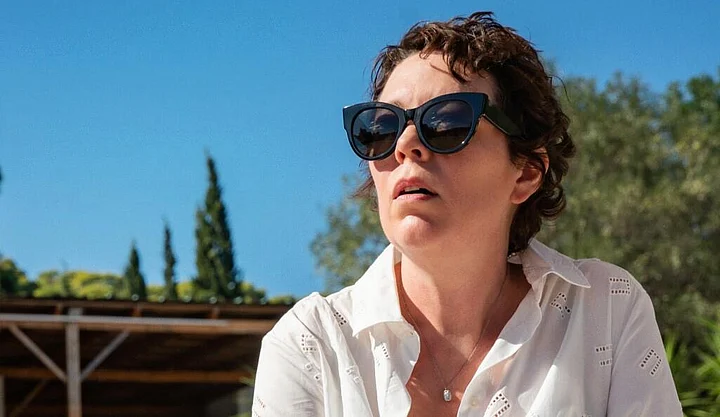There are no lost daughters in Maggie Gyllenhaal's The Lost Daughter. Only some lost mothers. Or are they lost? Or is it just what we have been led to believe for so long?
And there is Olivia Colman doing Olivia Colman things. With her eyes, her lips, and her voice.
An adaptation of Elena Ferrante's novel by the same name, this film is not your regular New Year Eve watch. It hits where it hurts the most: the sinews that connect the visceral and the ideal in us. The ideas that connect us to those around us. The very structures that we erect to connect, and separate, what is within and without us.
A Multi-Millennia-Old Trope of Guilty Women
It is no coincidence that middle-aged Leda Caruso, played by Colman, is a professor of literature. Italian literature at that. Gyllenhaal is letting nothing from her thespian, literary, and cinematic lineage go to waste. So, of course, the protagonist has a name that invokes rape: the mythological rape of Leda by Zeus, who assumed the form of a swan. WB Yeats immortalised it in his poem 'Leda and the Swan'. Our Leda is also working on a Yeats project.
The result of this rape was the birth of two sisters: Helen and Clytemnestra, who are said to have brought destruction to Greece. Married to brothers Agamemnon and Menelaus, Clytemnestra and Helen are the two most maligned women in the Greek mythology. Helen of Troy, 'causes' the Trojan war by eloping with Paris, and Clytemnestra kills king Agamemnon upon his victorious return after avenging the family honour.
It is advisable to keep these seemingly useless literary details handy to savour each layer of this filo pastry of a film.
Leda, by her own admission, is an unnatural mother. She's also selfish and painfully aware of it, too. The undercurrents of violence, sexual transgressions, revenge et al, however, are shielded from her sight, or she chooses not to see them.
A Plot of Mothers and Daughters
The story is about a middle-aged woman looking back her life as a young mother when she encounters a mother-daughter duo during her vacation in Greece. The viewers do not get to be omniscient as the only window to Leda's past is through her memories triggered by the scenes at the beach. We see Leda as a young academic—mother of two girls—trying to do her best to "have it all". Bianca and Martha, her daughters, are everything that young children are supposed to be: cute, affectionate, attention-seeking, exhaustingly demanding, innocuously violent, and more.
Leda, the academic, is at loggerheads with Leda, the mother. Joe, her husband, predictably, has the luxury to get away from the chaos at home to pursue his academic dreams. Young Leda's experiments with motherhood reminds one of Doris Lessing's protagonist Anna Wulf in The Golden Notebook. Anna realises that her relationship with little daughter Janet is nothing like what it's expected to be. Playing with baby Janet, Anna imagines herself as being in this make-belief world of domesticity and motherhood.
Leda's world of motherhood, too, exhausts her. And she leaves it behind. Her affair with a senior professor starts with his acknowledgment of Leda as an exceptional scholar. Their short-lived romance is only a bit more than an extension of that acknowledgment.
Leda, eventually, comes back to her daughters. But not because they needed her.
Who is Lost?
The sub-plot of Nina (Dakota Johnson), the young mother at the beach, is a foil to Leda's story. While unhappy, Nina chooses to stay married to Toni but has a side sex hustle with the resort boy Will. Nina's story is nudge to another feminist classic, The Awakening by Kate Chopin.
But let's come back to Leda.
When Nina's daughter Elena is lost at the beach, Leda gets the flashbacks of her own similar experience with Bianca's brief disappearance at a beach. She later finds Elena playing by herself behind a rock.
"My mama is lost," says Elena upon seeing Leda. Never was a metaphorical truism delivered by a child with sharper irony. For the child, the mother is lost. For the mother, her older self is lost. For the oppressive social structures around both, the idea of sacred motherhood is lost.
Gyllenhaal's film is an examination of guilt that women are forced to carry for not being perfect mothers. Through the character of Callie, Nina's pregnant sister-in-law, Gyllenhaal is successful in exemplifying how motherhood remains a received idea for most women, to be followed to boot, rather than a personal engagement.
Leda teaches Italian phrases and sentences to her daughters who, then, repeat the same to guests at dinner. There are mothers who tell the story of Shakespeare's King Lear to their toddlers because there's no time to learn any lullabies and there is a dissertation waiting to be typed amidst a pile of diapers, chew toys, baby clothes etc but the pins-and-needles sensation in the arm—due to the constant rocking motion to put the children to sleep—won't go away.
The climax of the film attempts to stay ambiguous but is quite clear. There is no point essentialising motherhood. Guilty mothers are a thing of the past, an idea that is past its shelf-life.
Leda did not commit a crime by being something other than a mother.
Helen did not start the Trojan war.
Clytemnestra did not kill her husband for fun.
And dolls get lost, stolen, or broken.
Move on!
Rating: 4.5/5
